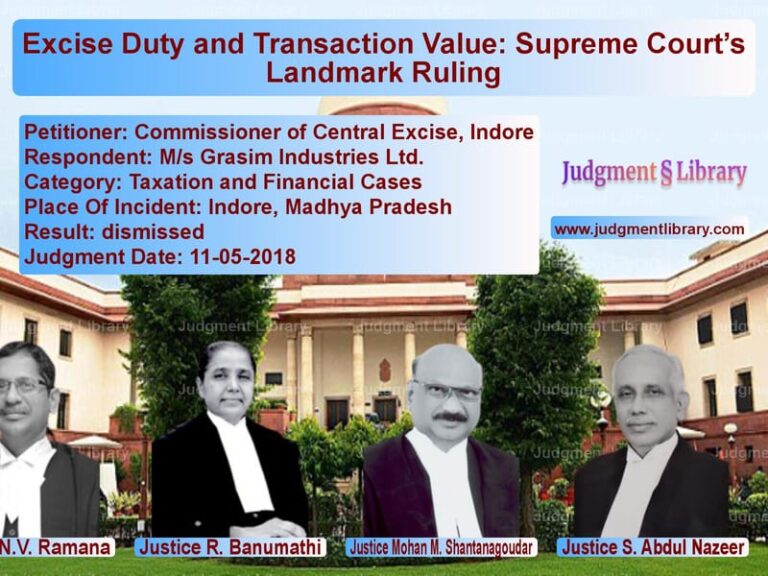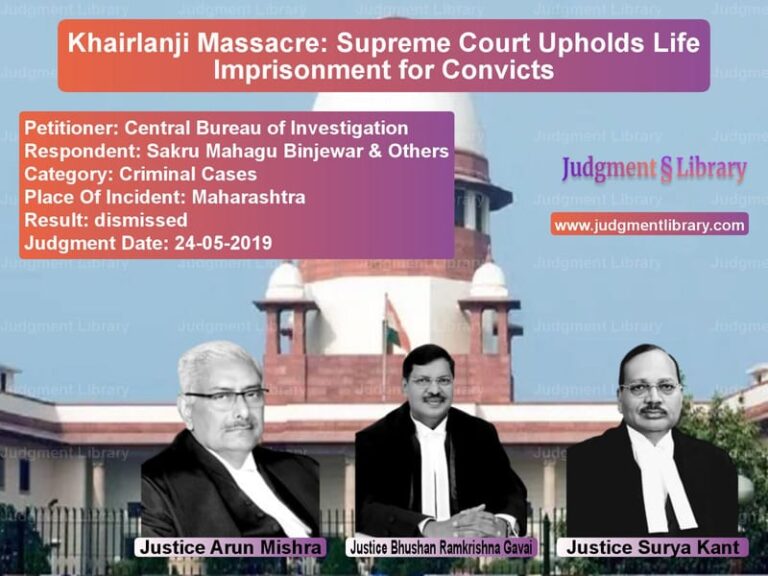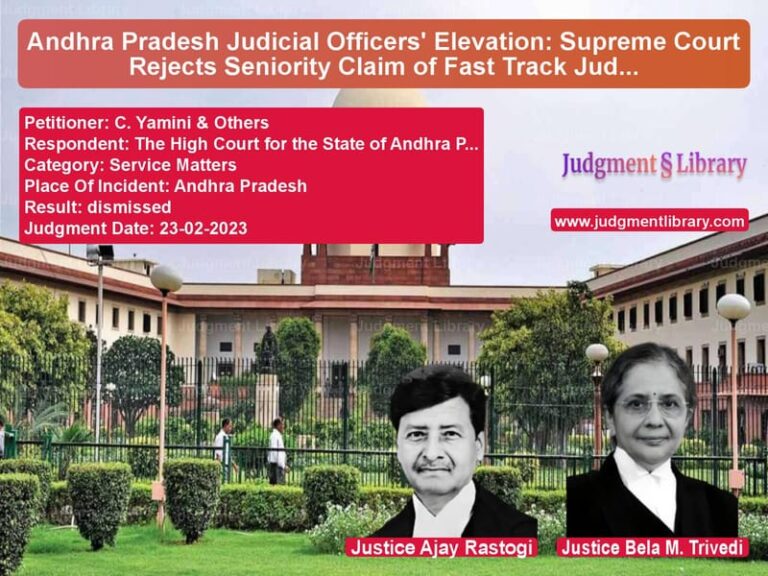Bank Employee’s Disciplinary Action Upheld by Supreme Court Despite High Court’s Intervention
The Supreme Court, in its judgment dated February 18, 2022, overturned the High Court’s ruling and upheld the disciplinary action taken against K.K. Bhardwaj, an Assistant Manager at UCO Bank. Bhardwaj had been accused of negligence leading to the theft of Rs. 12 lakhs from the Sewla Branch in 1999, where he was one of the custodians of cash. The Court ruled that the disciplinary proceedings and the punishment imposed were justified, highlighting the respondent’s failure to follow bank regulations regarding the handling of cash and keys.
Background of the Case
The incident in question occurred on the night of November 10-11, 1999, when a theft was reported from the cash safe of the Sewla Branch of UCO Bank. The respondent, K.K. Bhardwaj, was the Assistant Manager and one of the joint custodians of cash at the branch. His failure to take proper precautions, including not securing the keys to the cash safe and not ensuring the safety of the branch after working hours, led to the theft of Rs. 12 lakhs.
The disciplinary proceedings were initiated by the bank, and a charge sheet was issued in December 1999, accusing Bhardwaj of dereliction of duty. Following an inquiry, he was found guilty of negligence in handling the keys and failing to take necessary actions to safeguard the cash. The inquiry officer concluded that Bhardwaj was responsible for the theft due to his lapse in duty. As a result, Bhardwaj was initially dismissed from service in December 2001.
Legal Proceedings
- 1999: Bhardwaj was accused of negligence leading to the theft of Rs. 12 lakhs from the Sewla Branch of UCO Bank.
- 2001: A departmental inquiry concluded that Bhardwaj was at fault for not securing the cash safe and keys.
- 2002: Bhardwaj was dismissed from service, and his appeal for reinstatement was rejected.
- 2019: The respondent challenged the dismissal in the High Court, which set aside the penalty, citing the responsibility of other officers, including the Branch Manager.
- 2022: The Supreme Court heard the case and ruled in favor of the bank, quashing the High Court’s decision and upholding the disciplinary action.
Arguments Presented
Petitioner’s (Bank’s) Arguments
The bank argued:
- Bhardwaj, as the Assistant Manager and one of the custodians of the cash safe, had a duty to ensure that the keys were securely handled and that proper procedures were followed.
- The theft occurred due to his negligence in leaving the keys in the branch premises overnight, which was in violation of bank policies.
- The inquiry was conducted fairly, and the findings were substantiated by evidence, including the testimony of the other staff and documentary records.
- The punishment of dismissal was appropriate given the gravity of the respondent’s negligence, which directly led to the loss of funds.
Respondent’s (Bhardwaj’s) Arguments
Bhardwaj’s counsel argued:
- The theft was not solely due to his actions but was a collective failure involving other officers, including the Branch Manager, who were equally responsible for the security of the cash and keys.
- As an Assistant Manager, his role was not as pivotal as that of the Branch Manager in ensuring the overall security of the branch.
- The inquiry proceedings were biased, and the charge of negligence was unfairly attributed to him without considering the larger context of the situation.
- The findings of the inquiry officer were flawed, and the penalties imposed were disproportionate to his role in the incident.
Supreme Court’s Observations
On the Role and Responsibility of Bhardwaj
The Court observed:
“Bhardwaj’s role as a joint custodian of cash carried significant responsibilities. His failure to follow proper procedures for the handling and security of keys was a clear lapse in duty.”
On the Findings of the Inquiry Officer
The Court noted that:
“The inquiry officer found charge nos. 1, 3, and 4 to be substantiated based on documentary evidence. There was sufficient material to support the conclusion that Bhardwaj was negligent in his duties as a custodian.”
The Court emphasized that while Bhardwaj claimed that other officers were equally responsible, his own failure to discharge his duties was a critical factor in the theft.
On the Role of the High Court
The Court criticized the High Court’s interference with the disciplinary proceedings:
“The High Court erred in focusing on the responsibility of the Branch Manager and Assistant Manager(Cash) rather than addressing the clear lapses in Bhardwaj’s duties. The High Court’s conclusion was based on an erroneous understanding of the facts.”
The Court reiterated that disciplinary decisions should be based on a thorough examination of the inquiry process and the findings derived from the available evidence, not on speculative or incomplete assessments.
Final Judgment
The Supreme Court ruled:
- The appeal was allowed, and the High Court’s decision was set aside.
- The dismissal order imposed on Bhardwaj by the disciplinary authority was upheld.
- The Court emphasized that Bhardwaj’s negligence in handling the keys directly led to the theft, and his failure to perform his duties with due diligence was a serious lapse.
Implications of the Judgment
This judgment has significant implications for employment law and disciplinary actions in public sector organizations:
- Clarification of Employee Responsibility: The ruling reinforces the importance of strict adherence to workplace policies and procedures, especially when handling critical responsibilities such as the security of assets.
- Role of High Courts in Disciplinary Matters: The decision underscores the limited scope of High Courts to interfere in disciplinary matters unless there is clear evidence of procedural irregularities or injustice.
- Judicial Review of Disciplinary Findings: The Court affirmed the principle that disciplinary authorities have the right to take appropriate actions based on their findings, provided those findings are supported by evidence and due process.
The Supreme Court’s decision provides clarity on the boundaries of judicial interference in disciplinary proceedings, ensuring that employees who fail to meet the required standards of conduct are held accountable for their actions.
Petitioner Name: UCO Bank.Respondent Name: K.K. Bhardwaj.Judgment By: Justice Ajay Rastogi, Justice Abhay S. Oka.Place Of Incident: Sewla Branch, Agra.Judgment Date: 18-02-2022.
Don’t miss out on the full details! Download the complete judgment in PDF format below and gain valuable insights instantly!
Download Judgment: uco-bank-vs-k.k.-bhardwaj-supreme-court-of-india-judgment-dated-18-02-2022.pdf
Directly Download Judgment: Directly download this Judgment
See all petitions in Employment Disputes
See all petitions in Disciplinary Proceedings
See all petitions in Public Sector Employees
See all petitions in Judgment by Ajay Rastogi
See all petitions in Judgment by Abhay S. Oka
See all petitions in allowed
See all petitions in Quashed
See all petitions in supreme court of India judgments February 2022
See all petitions in 2022 judgments
See all posts in Service Matters Category
See all allowed petitions in Service Matters Category
See all Dismissed petitions in Service Matters Category
See all partially allowed petitions in Service Matters Category







